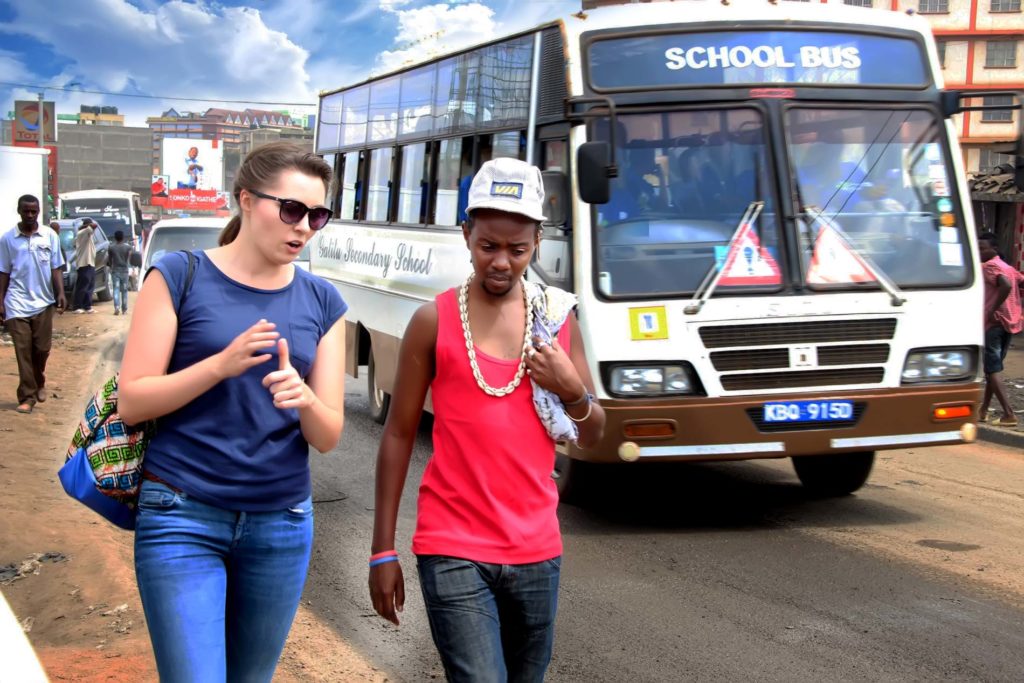During a unique tour through the hectic Downtown district of the Kenyan capital Nairobi, you’ll talk to the guys from Nai Nami, who will help you understand what Kenya‘s largest city is all about through interaction and conversation.
An unforgettable experience
“Do you see those tourists walking over there, with expensive watches around their wrists and big cameras on their bellies? Those are exactly the kind of people we used to rob.” It’s a quote from Cheddaz, one of our tour leaders, who we definitely won’t forget any time soon. It characterizes this tour of ex-gangsters, who uncover a world that would otherwise have remained hidden.
Earlier that day we got a message in a newly made Whatsapp group. “Hi everyone, thank you very much for booking the Nai Nami Tour and welcome to the groups app with your guides Cheddaz, Kissmart, Mrembe and Donga. Make sure you are in front of the Bata shop in the CBD at 2 pm on Friday! Thanks again, we look forward to giving you an unforgettable experience!”
Nairobbery
Reading this decent message, you wouldn’t immediately say that it comes from boys who used to live a rough life on the streets of Nairobi. The city is still called ‘Nairobbery’ by some – as a cynical nod to the high number of robberies that ravaged the city for years. Robberies still occur, but fortunately way less than five to ten years ago. Yet, just like in almost every metropolis, there are neighbourhoods that you’d better not visit. ‘Downtown’, the district where the boys from Nai Nami will lead us through, is one of those districts.
Always different
I recognize Cheddaz from the picture in the groups’ app: he wears his dreadlocks in a tail on the back of his head and is a bit smaller than his wide-smiling friend Donga and Kissmart, the boy with shorter dreads who is standing at his side. The boys look as slick as the message they sent: it is clear that Cheddaz and his companions no longer live out on the street. “You must be Dzjoest,” he says, while he walks up to me. ” A pleasure to meet you, we will wait for our other guests and then we can start the tour.”
While we wait for the rest of the group, Cheddaz tells us what to expect from the tour; a social enterprise that started a few years ago. “No Nai Nami experience is the same. That’s not only because we never really take a fixed route through Downtown, but also because the tour consists of a conversation between you and me. I will learn from you, and I hope you will learn from me as well.”
A personal experience
Nai Nami, which literally means ‘Nairobi with me’, particularly focuses on the interaction with guides. That’s partly due to the fact that there aren’t many places of special interest in the centre of Nairobi: the city doesn’t exist that long, 150 years ago it wasn’t even a village yet. Many of the colonial buildings built by the British have been replaced by large blocks of flats.
When the other participants, an American and a Japanese, have arrived, the tour is ready to start. Each ‘guest’ is assigned one guide, but we are reminded that we can talk to anyone. “Even if the total group of guests would consist of twelve people, we make sure that we have twelve guides,” explains Cheddaz. “This way everyone gets a personal experience.”

‘No ‘people-gazing safari’
In Nairobi, an enormous city with many slums, taking a tour through the Kibera- or Mathare-slum, would also be a possibility, but we soon find out that the gentlemen of Nai Nami are not very happy with those. “We could easily also organize this tour in Mathare because that’s where we come from,” says Kissmart. “But we deliberately don’t. We don’t like slum tourism.”
And indeed, the Nai Nami tour turns out not to be a ‘people-gazing safari’ at all. During our hike, we don’t walk through a residential area, but through the lively ‘Downtown’ district, where everyone is busy hustling. When wandering through the district, our guides are actively shaking hands and waving at friends. The ‘street smart’ guys seem to know everyone, and it’s clear they’re respected.
When a boy, who is clearly under influence, tries to sell me something, Cheddaz keeps him at a distance. We don’t understand what is being said, but very soon the boy drips off. By now I know that Cheddaz used to be no nicer and I know for sure: people still have him high up. When we meet the tourists who “certainly would have been robbed by Cheddaz in the past,” it seems the right time to talk about his criminal past.
“We’ve almost all been in jail”
It comes straight out, Cheddaz certainly has told this story many times. “I was definitely no sweetheart and I have committed many crimes. Almost all of us have been in jail,” says Cheddaz without blushing.
Many of the boys were not even pickpockets, but armed robbers who injured people. One of the boys used his teeth to draw wedding rings from hands sticking out of car windows, another one grabbed phones from people in traffic. “We are so open about our criminal background because we had no choice,” explains Kissmart, who walks behind us. “Life on the streets is hard. It’s eating or being eaten.”
”Life on the streets is hard. It’s eating or being eaten.”
Kissmart
Many of the Nai Nami-boys grew up in the slums and were therefore underprivileged. At an early age, they were sniffing glue and smoking marijuana. Since they had been exposed to drugs at a young age, it was a small step towards drug trafficking, pickpocketing and robbery.
The beginning of Nai Nami
Cheddaz already knew Kissmart a bit from the streets, but he only really met him at one of Kissmart’s concerts, he says: “although I actually came to the gig to steal from visitors, I got inspired by his music.” Afterwards, together with Donga, the three of them started making music under the name ‘Nairobeez’. However, the fact that the trio was now making music, did not mean that they were no longer active in the criminal world – there wasn’t much money to be made with music.
However, the music pulled them from the criminal world of Nairobi. They got to know Gianmarco, a Swiss student in ‘social innovation management’. It was Gianmarco who saw three talented but underprivileged boys instead of three street scoundrels. “Together with Sriram, another social entrepreneur from India, they wanted to come up with a way to build a future for us,” says Cheddaz. And that’s how Nai Nami was founded: a tour through the streets where Cheddaz and his friends literally grew up. All of this is now a couple of years ago, and the boys vowed that they will only fairly earn money.
Living without crime
After our trip along the old train station and through a colourful market full of hard-working market women, our tour ends at a small restaurant specializing in Kenyan cuisine: ugali (mashed corn porridge), spinach and a roasted goat or chicken. We ask Cheddaz what he will do after our tour.
“This afternoon we go back to the studio,” he says. “More and more people are listening to our music, including the children from the slums where we come from. It feels good to show them that there is also a life without crime, even if you grow up in a difficult neighbourhood.” When we say goodbye, we realize that the experience the boys promised in their first Whatsapp message is indeed unforgettable. Because everyone has been walking with a different guide all afternoon, we find out that we have all talked about different things. One thing is certain: exactly because of all these different conversations with the gentlemen, we have learned a lot about what life in Nairobi can be like.


Recent Comments